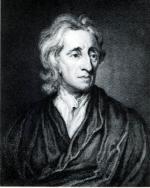|
This section contains 716 words (approx. 3 pages at 300 words per page) |

|
John Locke on the Nature of Freedom
Summary: In "Two Treaties of Government," John Locke wrote that societies that are not self-governing inevitable surpress their citizens' freedoms. These writings are the philosophical basis for the French and American Revolutions.
Despite a lack of government, Locke write in "Two Treaties of Government" that he believes in the self-governing of the people, and that primitive ideologies are the foundations of direction. Locke explains that all men are in a "State of perfect Freedom" where everyone has the rights to control their own actions and belongings within the bounds of nature. There is a balance of power, for each person is no more powerful than another. Equality is maintained because everyone has similar abilities. However, it can be destroyed when a ruler wrongfully divides people into classes (especially those of inferiority), essentially dissolving their rights. Literally, Locke discusses destruction of life, health, and liberty as a consequence of poor leadership. In fact, the very liberties which grant us freedom make us the prisoners of social taboo and unacceptance, such as suicide. To preserve the rights of mankind, we must not...
|
This section contains 716 words (approx. 3 pages at 300 words per page) |

|


